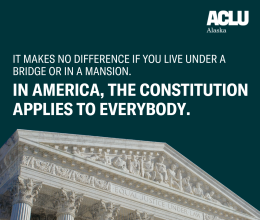Today, the U.S. Supreme Court ruled today that cities can punish unhoused people for sleeping in public, even if they have nowhere else to go.
Grants Pass v. Johnson involves an Oregon town that passed ordinances barring people from sleeping outside in public using a blanket, pillow, or even a cardboard sheet to lie on. Last year, the Ninth Circuit Court of Appeals ruled that criminally punishing unhoused people violates the Eighth Amendment “if there are no other public areas or appropriate shelters where those individuals can sleep.” Today’s decision by the U.S. Supreme Court overturns this constitutional protection for unhoused people with nowhere to go.
In April, the ACLU of Alaska joined the national American Civil Liberties Union, and 18 other ACLU affiliates across the country by submitting a friend-of-the-court brief in Grants Pass v. Johnson.
“Today’s ruling is a bleak and cruel decision that will allow cities to punish people who are just trying to survive while living unhoused,” said Ruth Botstein, Legal Director for the ACLU of Alaska. “Despite this incredibly concerning ruling, we are hopeful that a new municipal administration in Anchorage will be committed to finding better and more effective ways to address the housing crisis in Anchorage. Our unhoused neighbors deserve the dignity and respect that all Anchorage residents should expect. The ACLU of Alaska is committed to working with the municipality and partners to find pathways to improve the lives and protect the constitutional rights of Alaskans experiencing homelessness.”
Last summer, the ACLU of Alaska filed a series of 16 appeals on behalf of unhoused Alaskans whose rights were violated when the Municipality attempted to abate the spaces they were sheltering without having an indoor shelter space available for them to go. These cases were stayed until a ruling was issued in Grants Pass v. Johnson, and are now ongoing.
